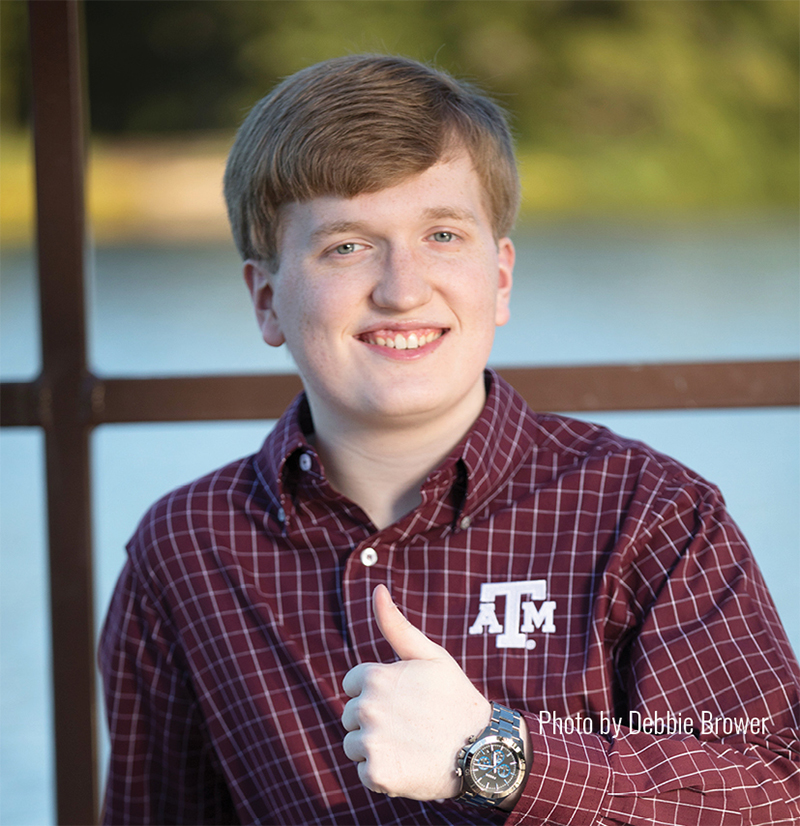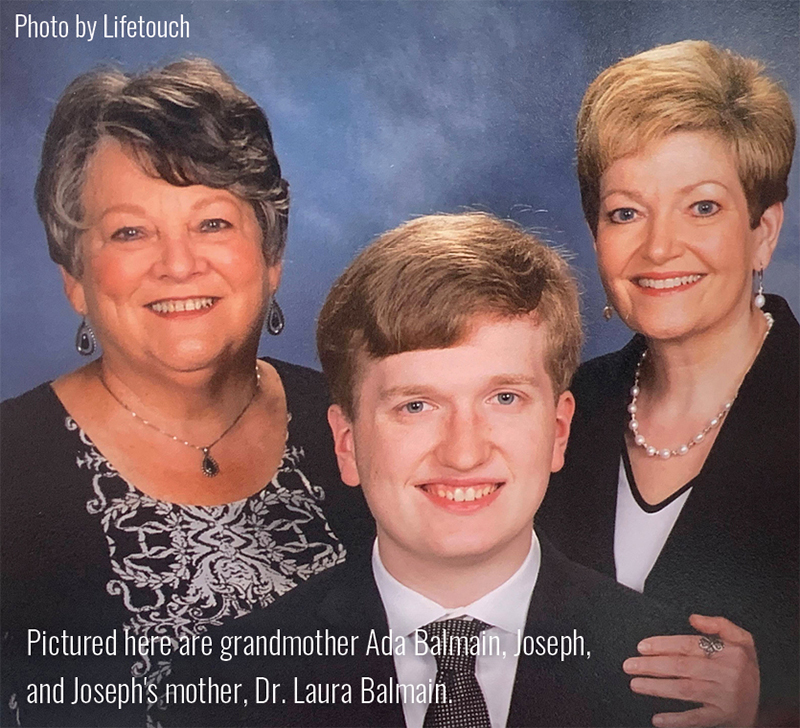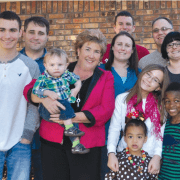For Joseph Balmain Rodgers, Autism is part of a Grander Plan

by Anna Cannon
At Texas High School’s 130th Commencement Ceremony, Joseph Balmain Rogers stands before a crow of over two thousand people. He’s taken the podium near the beginning of the ceremony, surrounded by orange and white flowers and framed by the image of the entire graduating class’s diploma folders on the table behind him. He begins his speech with jokes about this own fear of public speaking, a witty story about Albert Einstein on a train, and words about life’s unpredictability.
Then things start to get more serious.
“Fourteen years ago, if anyone told you that I was the valedictorian of my high school class, or even that I would go to college, you would have laughed at the thought,” he says. “The doctors who diagnosed me would have scoffed. They told my mother that she would need to learn sign language so she could communicate with me, to achieve a basic level of coordination with me to feed me, clothe me, even to tell me that she loves me. They said I would never go to college. That I would struggle all the way through 12th grade. That I would never talk. They diagnosed me with autism.”
Throughout his life, Joseph has gone above and beyond the limits that his doctors initially prescribed, and he will continue to do so in the future. In the fall, he will be attending Texas A&M University’s Business Honors program, with plans to attend law school, medical school, or business school after he graduates.
“For law school, I’m actually looking at Harvard,” he says when I interview him, almost a few months after the ceremony. “I’ve known my whole life that I’m basically defying expectations.”
Joseph’s family began to wonder if he had a disability after noticing some of his repeated behaviors, which were abnormal for a child without a disability but entirely common in children with autism. He would only sleep if his bedroom was cold, and completely silent and dark — even the light from an alarm clock was a problem. He wasn’t social like other children, and would scream every time he was exposed to loud noises.
 “My grandma caught onto it really early,” he says. “She mentioned to my mom one day, ‘What if he has something? What if there’s something wrong with him?’ [My mom] denied it at first, but I guess as things went along and as I grew up she couldn’t ignore it anymore.”
“My grandma caught onto it really early,” he says. “She mentioned to my mom one day, ‘What if he has something? What if there’s something wrong with him?’ [My mom] denied it at first, but I guess as things went along and as I grew up she couldn’t ignore it anymore.”
When Joseph was finally diagnosed at age four, he says that his parents were “devastated.” His mother, gastroenterologist Laura Balmain, grew up poor, and wanted to see her son become even more economically successful than she was.
“My mom worked very hard and worked all the way through medical school and residency to become a doctor, basically to elevate our economic status up from lower class, and she wanted me to do even better than her, because that’s what her parents wanted for her,” he says. “When she figured out that I had autism, she lost basically all hope.”
The family moved from Texas to Tennessee when Joseph was a year old, and after his diagnosis, his mother bought a farm so that Joseph would have a place to work when he finished high school.
“She thought that since I wouldn’t go to college, I wouldn’t work in any academic setting like an office or a hospital or a law firm. And the irony of it is that the exact opposite turned out to be true. I hate the farm,” he laughs.
Balmain enrolled Joseph in speech therapy, physical therapy and occupational therapy, in order to train Joseph’s mind and body to overcome some of the unique developmental challenges that he faced due to his autism. For instance, whenever Joseph touched something, his mind was unable to process characteristics like texture, temperature, and moisture in order to tell what it actually was.
“I can’t remember if it was physical or occupational, one of those therapies, there would be various substances in a bunch of bowls that I would put my hands in, and they would train my brain to reconcile the texture with the substance with what it actually was, so I could tell the difference between smooth and grainy, or gelatin, versus something that may be hot or cold,” he says. “We had a playroom, which was actually a therapy room at the back of our house. There was a little wheel where you would sit on the ground, kind of like a merry-go-round, and my mom would put me on it and spin me, again to reconcile my mind with the sensation that I was spinning.”
Soon, Joseph had progressed so much that he was able to attend preschool, where he spent half of his time in special education class and half in mainstream classes. About halfway through the year, he was functioning well enough to leave special education classes, and spent the rest of his school years in mainstream classes.
When I speak to Joseph over the phone, he is in Colorado at a Worldview camp. Worldview is a Christian leadership conference designed to make young leaders think hard about their faith, and he has been there for almost a week. He’s outdoors, and I can hear the sounds of other high schoolers playing games in the background. Every now and then, a shriek or a shouted phrase rises above the general din — something that, if Joseph were still young, might have caused him extreme discomfort. But loud noises don’t bother him anymore.
“The speaker yesterday was talking about Frank Sinatra’s song My Way,” he tells me. “He mentioned, if you know anything about Frank Sinatra, he was very, I guess, narcissistic, and the song My Way was, ‘I did everything on my own, I didn’t have any help, I didn’t want any help,’ basically ‘I’m self-made.’ But I believe that’s a false narrative, especially for my life, because I’m not self-made at all, I’m only a giant by standing on other people’s shoulders. And I believe that, and Hillary Clinton’s quote that says, ‘It takes a village.’ Like those two quotes heavily embody my life.”
In part of his speech, Joseph credited his personal growth to the help of his mother, his teachers and therapists, and everyone else who helped him along the way. But at the end, he credited everything to God, and his journey in faith for helping him throughout his life.

“God has been the most important part of this entire story,” he says. “If you look at the Bible, almost every single figure in the Bible, with the exception of Jesus, was a terrible person or an ordinary person or was messed up in some way. Like David was an adulterer, Joseph–my namesake–was sold into slavery, and he still trusted in God and years later he became the second-in-power over an entire nation. I believe that God gave me autism, not because he prevents evil and suffering in the world, but because it was part of a grander plan. Because now I can use that and that story. I’m a miracle. I’m not still under the tentacles of autism, I’ve grown much more past that and beyond that. That just shows God’s power, and I knew that if I was going to give a speech during graduation that my true purpose was to honor God.”
His mother’s love and effort were instrumental to his progress throughout his childhood–whether it was enrolling him in therapy and working with him at home on coordination, bringing him to church, or just loving him for who he is, her support has been a deciding factor in his success.
“To my mom, I would say thank you so much for never giving up on me, and thank you for not giving up on God,” he says. “My relationship with my mom is, I believe, unparalleled for a momma’s boy. She’s been so patient with me over the years and so loving.”
When I ask him if he has anything else to add before the interview concludes, he laughs.
“Gig ’em Aggies.”









